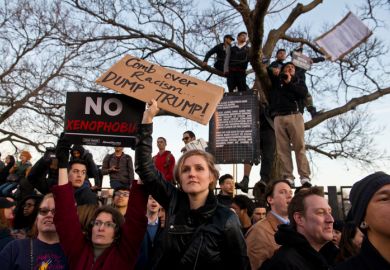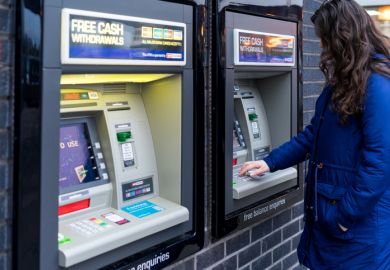The London School of Economics’ decision to enrol a US student who once described himself as a “white nationalist” after becoming the face of last year’s far-right Charlottesville rally has sparked debate about the extent to which universities can consider an applicant’s political views in their admissions processes.
Peter Cvjetanovic achieved worldwide notoriety – and was the subject of an unsuccessful campaign to get him expelled from his university in the US – after a photograph of him shouting while holding a flaming torch was widely shared online.
Mr Cvjetanovic, at the time a 20-year-old undergraduate student at the University of Nevada, Reno, said in one interview after the rally: “I will defend tooth and nail my views as a white nationalist. I love my culture and will fight for it but never in a violent way.”
However, in a television interview a few months later, he said that “calling myself a white nationalist was very wrong and I no longer agree, I no longer see myself as such”.
Now, a LinkedIn profile under the name Peter Cvjetanovic states that he has moved on from that institution after graduation to study a master’s in political theory at the LSE. A Twitter account under the same name states the same.
Times Higher Education has been told that another master’s student has complained to the LSE after being placed in the same halls of residence as Mr Cvjetanovic.
The LSE – founded by Fabian socialists and known for its international student body – might appear an unlikely destination for a student who once described himself as a white nationalist.
Mr Cvjetanovic’s arrival also comes at a time when issues of freedom of speech on campus and safe spaces for students are the subjects of intense media and political debate.
This particular case raises important questions about whether or not universities can, or should, take into account any extreme political views held by applicants when deciding whether to admit them; and how they should respond to concerns that staff or other students may have about working and learning alongside such individuals.
An LSE spokesman said that the institution “does not discuss details of individual students or student complaints”.
“Nevertheless, we take any complaints that are received very seriously and have robust procedures in place to ensure that all issues of concern raised are dealt with promptly and fairly,” the spokesman added.
“LSE is committed to equity, diversity and inclusion for all members of the school community. Students and staff are free to hold and express their own views, however, we expect everyone within the LSE community to treat each other with respect at all times.
“Graduate selections are made on the basis of the strength of an individual’s application, with an experienced selector assessing each application, including personal statement and references, alongside agreed criteria set by the department.”
Dennis Farrington, co-author of The Law of Higher Education, said that institutions in the UK “have the unqualified right to admit or refuse to admit anyone as a student provided they act within the law and do not discriminate on grounds set out in the Equality Act”.
“Employment case law in UK courts and [the European Convention on Human Rights] suggests that in some cases political beliefs can be considered to be philosophical beliefs and therefore a protected characteristic,” he added. But this was “in the context of statutory employment protection”, Dr Farrington stressed.
But he also said that “if the institution feels that the person concerned is a risk to fellow students in terms of a common law or health and safety duty of care then arguably it should take time to consider that risk before admission”.
Dr Farrington continued: “Admission to student accommodation is a separate issue. Assuming that the residence in question is operated by the institution and not any other entity, I would expect the institution to have regard to the safety of all residents, including the individual concerned, when deciding whether to offer a place.”
David Palfreyman, Dr Farrington's co-author and director of the Oxford Centre for Higher Education Policy, said that it was “not easy” for the LSE “to balance its conflicting statutory obligations” in terms of a non-discriminatory admissions policy and a common law duty of care.
He pointed out that the LSE’s articles of association are “more explicit” than most universities’ governing principles on ruling out discrimination in admissions.
After the Charlottesville rally, a petition circulated calling on the University of Nevada, Reno to expel Mr Cvjetanovic. However, the university’s president, Marc Johnson, ensured that he was able to continue attending the university and graduate – eschewing options such as denying him access to the campus on safety grounds or forcing him to complete online.
Freedom of speech is protected under the US constitution, to which public institutions must have particular regard.
“He has a right to pursue his education at a state institution,” Dr Johnson told Inside Higher Ed.
POSTSCRIPT:
Print headline: Should LSE let US ‘white nationalist’ study MSc?
Register to continue
Why register?
- Registration is free and only takes a moment
- Once registered, you can read 3 articles a month
- Sign up for our newsletter
Subscribe
Or subscribe for unlimited access to:
- Unlimited access to news, views, insights & reviews
- Digital editions
- Digital access to THE’s university and college rankings analysis
Already registered or a current subscriber?








